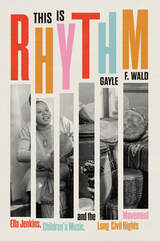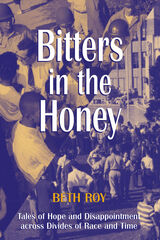
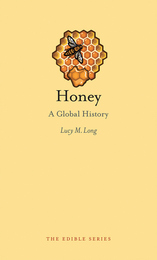
Long points to a crucial fact about honey: it can be enjoyed with very little human processing, which makes it one of the most natural foods we consume. Its nutritional qualities and flavors dramatically reflect the surroundings in which it is produced, and those who produce it—bees—are some of the most important insects in the world, the chief pollinators of wild plants and domesticated crops alike. Showing how honey has figured in politics, religion, economics, and popular culture, Long also directly explores its tastiest use—in our food and drink—offering a history of its culinary place in the world, one sweetened with an assortment of delicious recipes. Lively and engaged, her account will give even the saltiest of us an insatiable sweet tooth.
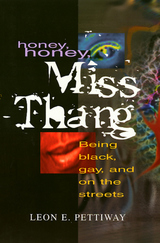
Many straight Americans would never embrace homosexuals as neighbors, co-workers, or friends. Still less would they accept as equals those transgendered individuals who work the streets to provide themselves with drug money.
This book seeks to change that perception. It celebrates the lives of Shontae, China, Keisha, Detra, and Monique, five Afro-American gay hustlers who struggle to survive and to maintain a life of dignity and value in the face of their drug use and criminal activity. As individuals they vary in terms of background, the manner in which they entered the transgendered world, and the nature of their initiation into the drug subculture. None of them has escaped the ravages of urban decline, crime, drugs, and poverty that accompany life in an inner city, but by the same token, none of them has capitulated to the stresses with which they live.
It is impossible to read these accounts and not come away emotionally drained. As Monique explains, their lives take place in a world of chances. "You take a chance on living or dying, on being hurt or not being hurt, a chance on finding a friend or finding an enemy." It is from this world that their voices speak so eloquently about their families, hustling, sexuality, sexual abuse, friendship, and intimacy.
By letting these women speak, Leon E. Pettiway evokes questions and encourages discussion and a re-evaluation of those who are labeled as deviant. Pettiway reaches beyond academic convention to offer a view with depth and emotion that mere statistics could never provide. While the poverty and often destructive lifestyle of these women may be gut-wrenching, their experiences reveal joy, pain, and the profound strength of the human spirit with which we can all identify. These lives have much to teach us about ourselves and those we label as "other."
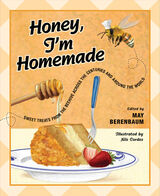
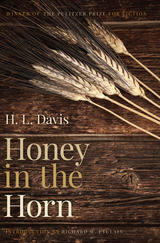
Clay Calvert, an orphan, works as a hand on a sheep ranch until he stumbles into trouble and is forced to flee. Journeying throughout the state, from the lush coastal forests, to the Columbia Gorge, to the golden wheat fields east of the Cascades, he encounters a cast of characters as rich and diverse as the land, including a native Tunne boy and a beautiful girl named Luce.
Originally published in 1935, Honey in the Horn reveals as much about the prevailing attitudes and beliefs of H. L. Davis’ lifetime as it does about the earlier era in which it is set. It transcends the limitations of its time through the sheer power and beauty of Davis’ prose. Full of humor and humanity, Davis’s first novel displays a vast knowledge of Pacific Northwest history, lore, and landscape.
An essential book for all serious readers of Northwest literature, this classic coming-of-age novel has been called the “Huckleberry Finn of the West.” It is the only Oregon book that has ever won a Pulitzer Prize for fiction. With a new introduction by Richard W. Etulain, this important work from one of Oregon’s premier authors is once again available for a new generation to enjoy.
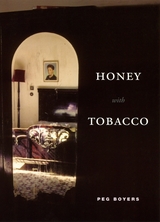
Pietà
This time the migraine came with a vision
bathed in night sweat:
I was sitting on the Eames chair,
your man’s body on my lap, legs
and arms white as casein draped over
mine, spilling onto the cassock, new sores
on your legs, dried blood
on your feet and hands,
from your chalk mouth
the words forgive me,
from mine, the impossible
no
Hard Bread,Peg Boyers’s debut poetry collection, with verse spoken in the imagined voice of the Italian writer Natalia Ginzburg, was widely praised for its inspired ventriloquism and its brilliant lyricism. In Honey with Tobacco, Boyers’s own intensely personal voice emerges in three strikingly distinctive variants. The first part of the book is the most explicitly autobiographical, bringing together poems that explore the poet’s Cuban American experience and a childhood marked by travel, the tropics, and varieties of disenchantment. The middle sequence of poems concerns a mother, a father, and a son, a postmodern holy family whose ordeals are evoked in a terse, terrifying narrative. In familiar tableaux drawn from the Bible that have inspired great works of art—the Annunciation, the Pieta, and Judgment Day—Boyers explores what it means in contemporary America to be “blessed among women” and whether and how art can contain grief. The final section of the book confronts age, desire, and regret in a series of personal poems that plumb baser human instincts and the speakers’ determination to dwell in darkness, when necessary, without abandoning the sacred.
Praise for Hard Bread:
“A great achievement of poetic voice . . . . It’s absolutely clear what these poems are ‘about,’ and they are unapologetic in their devotion to subject, clarity, precision, and accessibility.”—Steven Cramer, Poetry
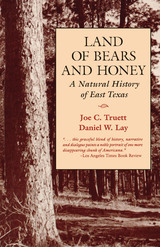
Winner, Ottis Lock Endowment Award for the best book on East Texas, East Texas Historical Association, 1985
Texas Literary Festival Award for Nonfiction (Southwestern Booksellers Association & Dallas Times Herald), 1985
Annual Publication Award, Texas Chapter of the Wildlife Society, 1984
The story of the land, wildlife, and ecology of East Texas.
READERS
Browse our collection.
PUBLISHERS
See BiblioVault's publisher services.
STUDENT SERVICES
Files for college accessibility offices.
UChicago Accessibility Resources
home | accessibility | search | about | contact us
BiblioVault ® 2001 - 2025
The University of Chicago Press






